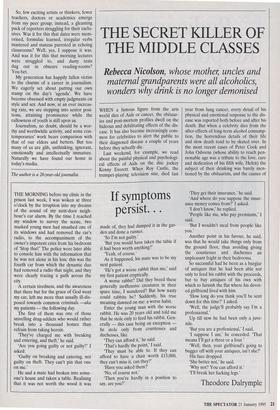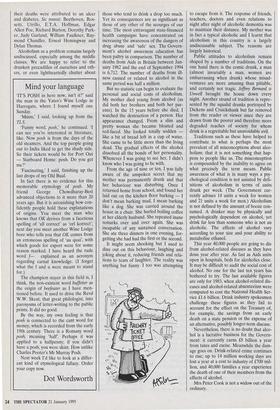THE SECRET KILLER OF THE MIDDLE CLASSES
Rebecca Nicolson, whose mother, uncles and
maternal grandparents were all alcoholics, wonders why drink is no longer demonised
WHEN a famous figure from the arts world dies of Aids or cancer, the obituar- ies and post-mortem profiles dwell on the hideous and debilitating effects of the dis- ease. It has also become increasingly com- mon for celebrities to alert the public to their diagnosed disease a couple of years before they actually die. Last weekend, for example, we read about the painful physical and psychologi- cal effects of Aids on the disc jockey Kenny Everett. When Roy Castle, the trumpet-playing television star, died last year from lung cancer, every detail of his physical and emotional response to the dis- ease was reported both before and after his death. But when a celebrity dies from the after-effects of long-term alcohol consump- tion, the horrendous details of their life and slow death tend to be skated over. In the most recent cases of Peter Cook and John Osborne (whose ability to reach pen- sionable age was a tribute to the love, care and dedication of his fifth wife, Helen) the subject of their drinking was barely men- tioned by the obituarists, and the causes of their deaths were attributed to an ulcer and diabetes. Sic transit: Beethoven, Ros- setti, Utrillo, E.T.A. Hoffman, Edgar Allen Poe, Richard Burton, Dorothy Park- er, Judy Garland, William Faulkner, Ray- mond Chandler, Ernest Hemingway and Dylan Thomas.
Alcoholism as a problem remains largely undiscussed, especially among the middle classes. We are happy to refer to the drunken peccadillos of ourselves and oth- ers, or even lightheartedly chatter about
Mind your language
`IT'S POSH in here now, isn't it?' said the man in the Yates's Wine Lodge in Harrogate, where I found myself one Sunday.
`Mmm,' I said, looking up from the TLS.
`Funny word, posh,' he continued. 'I can see you're interested in literature, like. Now posh is from the days of the old steamers. And the top people going out to India liked to get the shady side. So their tickets would be for Port Out — Starboard Home: posh. Do you get me?'
`Fascinating,' I said, finishing up the last drops of my Old Bual.
In fact there is no evidence for this memorable etymology of posh. My friend George Chowdharay-Best advanced objections to it more than 20 years ago. But it is astonishing how con- fidently people hold these explanations of origins. You meet the man who knows that OK derives from a facetious spelling of 'all correct' as `orl korrect'; next day you meet another Wine Lodge bore who tells you that OK comes from an erroneous spelling of 'au quai', with which goods for export were for some reason marked. I have heard the rude word f— explained as an acronym regarding carnal knowledge. (I forget what the f and u were meant to stand for.) The champion stayer in this field is, I think, the non-existent word buffetier as the origin of beefeater as I have men- tioned before. It used to drive the Revd W.W. Skeat, that great philologist, into paroxysms of letter-writing to the public prints. It did no good.
By the way, my own feeling is that posh is connected to the cant word for money, which is recorded from the early 19th century. There is a Romany word posh, meaning 'half. Perhaps it was applied to a halfpenny; if you didn't have a posh, you were skint. How unlike Charles Pooter's Mr Murray Posh.
Next week I'd like to look at a differ- ent kind of etymological fallacy. Order your copy now.
Dot Wordsworth
those who tend to drink a drop too much. Yet its consequences are as significant as those of any other of the scourges of our time. The most extravagant state-financed health campaigns have concentrated on increasing the awareness of the dangers of drug abuse and 'safe' sex. The Govern- ment's alcohol awareness education has been paltry in comparison. The number of deaths from Aids in Britain between Jan- uary 1982 and the end of September 1994 is 6,712. The number of deaths from ill- ness caused or related to alcohol in the same period was half a million.
But no statistic can begin to evaluate the personal and social costs of alcoholism. My mother died young from alcohol (as did both her brothers and both her par- ents). In the 15 years before she died, I watched the destruction of a person. Her appearance changed. From a slim and pretty woman she became bloated and red-faced. She looked totally sodden like a bit of bread left in a cup of water. She came to be little more than the living dead. The gradual effects of the alcohol dissolved all the bonds of her personality. Whenever I was going to see her, I didn't know who I was going to be with.
From the age of nine or ten, I was fully aware of the unspoken secret that my mother was permanently drunk and that her behaviour was disturbing. Once I returned home from school, and found her laid out on the kitchen floor barking — I don't mean barking mad, I mean barking like a dog. She was carried around the house in a chair. She hurled boiling coffee at her elderly husband. She repeated inane remarks over and over again. She was incapable of any sustained conversation. She ate three dinners in one evening, for- getting she had had the first or the second.
It might seem shocking but I used to dine out on this behaviour, laughing and joking about it, reducing friends and rela- tions to tears of laughter. The reality was anything but funny. I too was attempting to escape from it. The response of friends, teachers, doctors and even relations to night after night of alcoholic dementia was to maintain their distance. My mother was in fact a typical alcoholic and I learnt that alcoholism in this country is a largely undiscussable subject. The reasons are largely historical.
Public attitudes to alcoholism remain shaped by a number of traditions. On the one hand there is the comic drunk, a man (almost invariably a man, women are embarrassing when drunk) whose misad- ventures are more amusing than pitiable, and certainly not tragic. Jeffrey Bernard is Unwell brought the house down every night. Another strand of tradition is repre- sented by the squalid drunks portrayed by Dickens and Cruickshank but far removed from the reader or viewer since they are drawn from the poorer and therefore more degraded reaches of society for whom drink is a regrettable but unavoidable evil.
Traditions such as these have helped to contribute to what is perhaps the most prevalent of all misconceptions about alco- holism: that it is not something that hap- pens to people like us. The misconception is compounded by the inability to agree on what precisely the term means. Public awareness of what is in many ways a psy- chological condition is not assisted by defi- nitions of alcoholism in terms of units drunk per week. (The Government cur- rently advises 14 units a week for women and 21 units a week for men.) Alcoholism is not defined by the amount of booze con- sumed. A drinker may be physically and psychologically dependent on alcohol, yet drink far less than someone who is not an alcoholic. The effects of alcohol vary according to your size and your ability to metabolise ethanol.
This year 40,000 people are going to die from alcohol-related diseases as they have done year after year. As fast as Aids units open in hospitals, beds for alcoholics close. It may be difficult to audit the social cost of alcohol. No one for the last ten years has bothered to try. The last available figures are only for 1983, when alcohol-related dis- eases and alcohol-related absenteeism were computed to cost the National Health Ser- vice £1.6 billion. Drink industry spokesmen challenge these figures as they fail to account for the effect on the Treasury of, for example, the savings from an early death on a state pension or the expense of an alternative, possibly longer-term disease.
Nevertheless, there is no doubt that alco- hol is a lucrative business for the Govern- ment: it currently earns £8 billion a year from taxes and excise. Meanwhile the dam- age goes on. Drink-related crime continues to rise; up to 14 million working days are lost a year at a cost to industry of £700 mil- lion, and 40,000 families a year experience the death of one of their members from the effects of alcohol.
Mrs Peter Cook is not a widow out of the ordinary.



























































 Previous page
Previous page